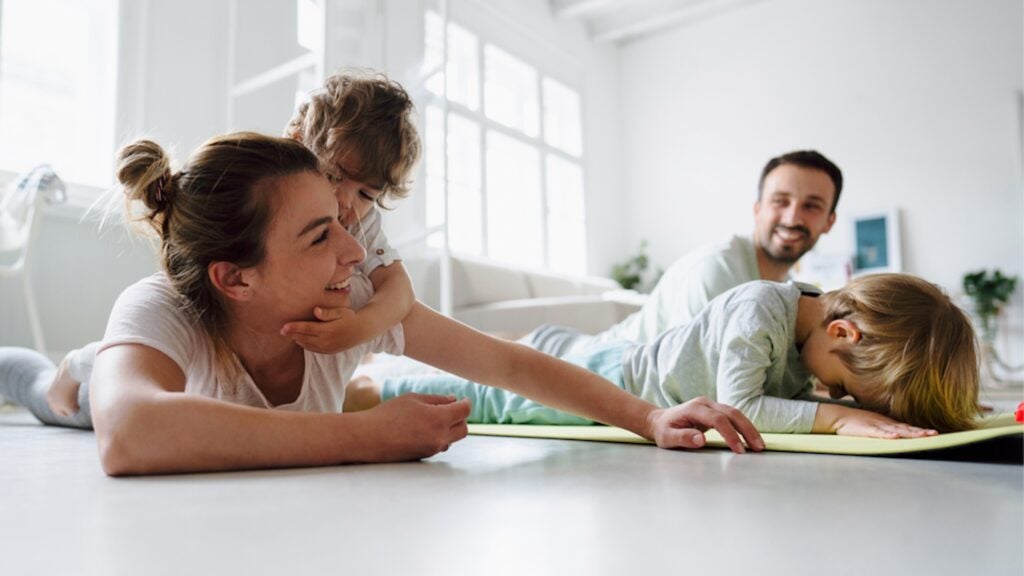No products in the cart.
Outdoor Adventure
5 Easy Ways to Introduce Mindfulness to Kids
New perk: Easily find new routes and hidden gems, upcoming running events, and more near you. Your weekly Local Running Newsletter has everything you need to lace up!
Subscribe today →.
For my daughter’s third birthday, my mother gifted her a child-size yoga mat as she was aware that her class had learned some basic yoga for kids, including Cobra and Downward-Facing Dog. (Actually, my daughter practiced Three-Legged Dog, but who am I to argue with a toddler?)
Although I had little confidence that my boisterous child could ever sit still long enough to practice meditation, I appreciated the thought. After I thanked my mother, I rolled up the mat and placed it next to my own, certain it would become another workout tool collecting dust.
I was wrong. It took a few months, but my daughter began gravitating toward her practice. She’d roll around on the mat and eagerly show me her focus during a wobbling Tree Pose. Of course, there were also times she’d turn her mat into a bed for her baby dolls. But hey, it was getting mileage!
Then she began to comply when I asked her to take three deep breaths at the end of a meltdown, something we’d been unsuccessfully practicing for months. She also began to verbalize when she needed space or had an urgent desire to move her body. Was my daughter learning that yoga isn’t just how we move into shapes but also how we move through our day?
According to Aparna Ravichander, a longtime yoga teacher and mom to a four-year-old, the answer is a resounding yes.
How to Introduce Mindfulness and Yoga to Kids
“It’s never too early to introduce mindfulness and compassion,” explains Ravichander, co-founder of Triangle Shala in Morrisville, North Carolina. “We count to five and inhale, we count to five and exhale. We imagine a happy light inside us. No matter a child’s age, you can start teaching the yogic principles of nonviolence and emotional management techniques.”
Born in Chennai, India, Ravichander was introduced to yoga early in life as part of her school curriculum. “Yoga is about community connection. We all need that, especially when we’re young,” she says.
Ravichander advocates for meeting the younger generation exactly where they are. She stresses the importance of encouraging kids to experiment, such as letting them go upside-down and do fun and funky backbends that adults may have a hard time doing. There is a lot of stillness in yoga, but it’s okay to match kids at their energy level. “If you’re going to make them sit and meditate, they’ll probably hate it,” she explains.
It’s also about introducing children to more than yoga’s physical postures. If you’re unsure where to start, here are five easy ideas for introducing your child to the principles of yoga. It might not click for them immediately, but as with most things, it’s the intention that counts.
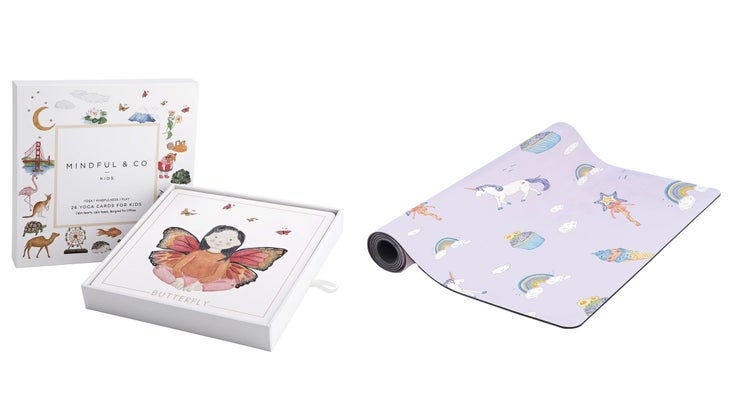
1. Yoga Mat + Flashcards
Dappled with whimsical illustrations, this Mindful & Co yoga mat and flash cards bundle ($120) introduces something Ravichander refers to as “yoga play.” Each of the 26 flashcards illustrates poses and explains how to put your body in each shape, allowing the cards to meet each child at their age and awareness level. The mat is hypoallergenic and biodegradable, made with recycled tree rubber for a non-slip grip, and has a soft, microfiber suede surface that comes imprinted with an array of likable characters. (And, like all the best kid-friendly products, the mat is machine washable.)
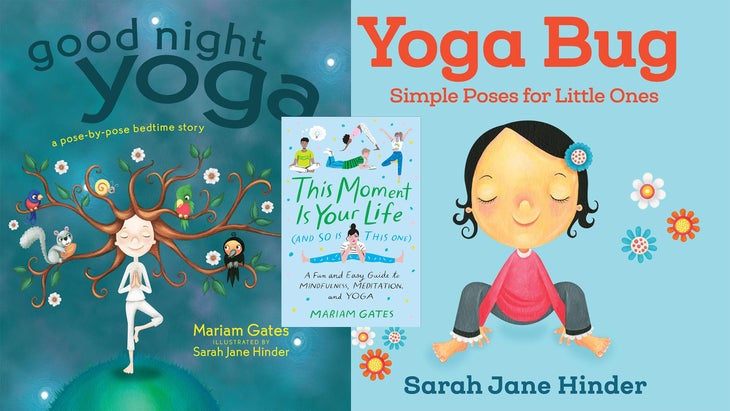
2. Books, Books, and More Yoga Books
Like flash cards, illustrated children’s books are an accessible way to expose children to the shapes of yoga while helping them connect the practice to the importance of mindfulness. For younger children, Aparna recommends Yoga Bug: Simple Poses for Little Ones and Good Night Yoga: A Pose-by-Pose Bedtime Story Older children might benefit from another Mariam Gates’ book, This Moment Is Your Life (and So Is This One): A Fun and Easy Guide to Mindfulness, Meditation, and Yoga, written specifically for tweens and teens.
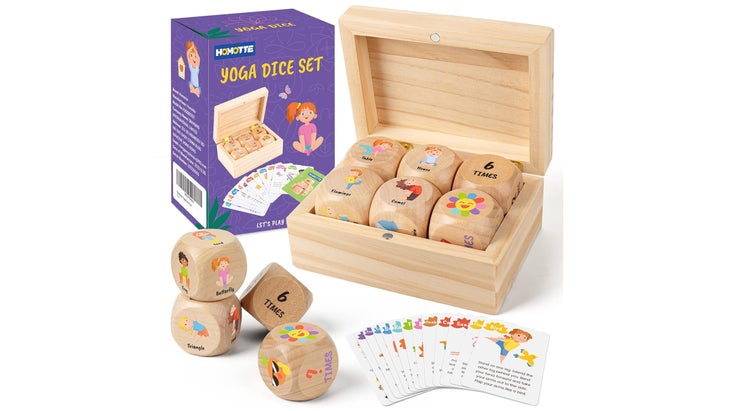
3. Yoga Dice Game
There are few better ways to engage kids than with a game. This wooden dice set ($17.99) asks them to roll the posture dice to explore a particular pose and the time dice to see how many repetitions to try. Instruction cards explain each pose so even newbies can play. It’s versatile enough to play in a group, one-on-one, or solo and offers 1,296 possible combinations of how you could practice with 24 poses and 12 cards. It might even be an opportunity for adults to sneak in some movement because what is parenting if not multitasking?
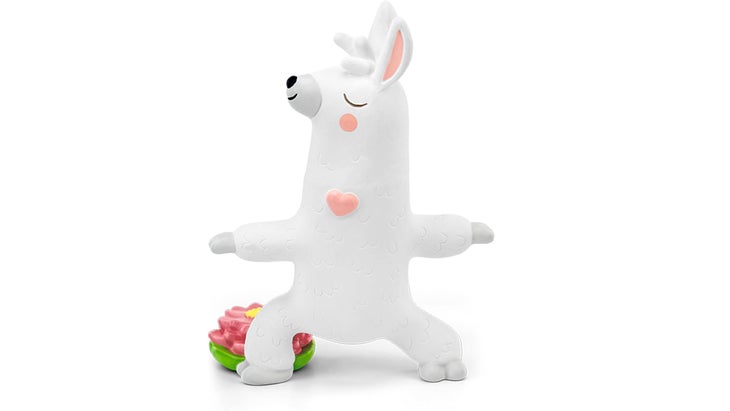
4. Yoga Tonie Learn + Listen
If you’re unfamiliar with the Tonie Box, it’s an audio player that connects to a small trinket called a Tonie and plays a curated list of songs or stories. In my home, we’ve been on a steady rotation of Frozen Tonies (one Elsa, one Anna, of course) and I look forward to the moment when we can move onto something more zen, like the Yoga Tonie ($17.99). Through a series of stories, the Yoga Tonie teaches kids about mindfulness, yoga poses, confidence, and friendship. It’s a fun, screen-free alternative that keeps children engaged as it introduces them to broader yoga basics. And it’s less likely to play on a loop in your head than “Let it Go.”

5. Peloton’s Kid-Friendly Yoga Classes
Longtime yoga and Pilates instructor Kristin McGee recently left Peloton but her joyful spirit lives on in her kid-friendly yoga classes on the Peloton app. These are easy-to-follow classes that introduce yoga poses and gentle movements to children in a playful, digestible manner. Her Fit Family Flow series includes videos as short as 10 minutes and as long as 30 minutes for tweens. My daughter and I especially appreciate these classes on rainy days when we’ve been cooped up without our usual neighborhood stroll.

